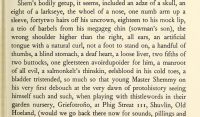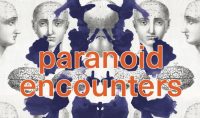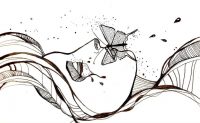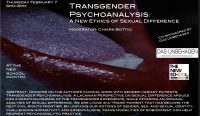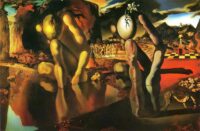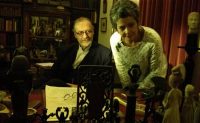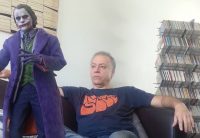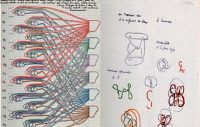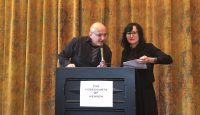Adrian Price: “An Artificial Tongue with a Natural Curl” – On Lacan’s Last Major Written Piece ‘Joyce le Symptôme’
Click here to link to audio © A.R. Price
Jamieson Webster: Paranoid Encounters – From Masculinity to #MeToo – Paranoia, Hysteria and Other Neurotic Dispositions
On April 4, 2019, Jamieson Webster presented the opening keynote lecture for Paranoid Encounters, a graduate conference organized by The New School Philosophy Department. The conference explores a perspective often disregarded, even rejected by philosophy — that of paranoia — in order to understand and gauge whether philosophy offer anything with respect to the contemporary intellectual and political climate of post-truths, surveillance, xenophobia, and ecological disaster. Special thanks to Pierre Schwarzer for organizing and making the audio available. Click here to listen to audio
The Stutter in Psychoanalysis: A Mini-Course with Michael Levine
Click here for Class #1 audio Click here for Class #2 audio Click here for Class #3 audio
Transgender Psychoanalysis: A New Ethics of Sexual Difference – Patricia Gherovici & Oren Gozlan
Click here for link to audio
Ray O’Neill on Dali, Lacan, Freud, Narcissism & the Double
Irish Lacanian psychoanalyst Ray O’Neill discusses the life and work of Salvador Dali from a psychoanalytic viewpoint, addressing narcissism, the theory of the double & posing the question what’s really in a name? This talk was first presented at the Psychoanalysis, Art & the Occult conference in London, and is titled “Double Double, Toil and Trouble, Psychoanalysis Burn and Surrealism Bubble”. For more from Dr. O’Neill visit: www.machna.ie www.renderingunconscious.org
Hilda & Freud: Collected Words
“The flowers and the words bear this in common, they are what I want. And the professor knew it.” H.D. Hilda & Freud: Collected Words is a play by Antonio Quinet based on H.D.’s Tribute to Freud, the letters she exchanged with Freud and her literary circle, her memoir of her psychoanalysis, and her poetry. Hilda Doolittle a.k.a H.D., a forty-seven-year-old American poet born in Philadelphia met Freud, then in his late seventies, in Vienna. This was in 1933, and it was the beginning of a transference “love affair” that included exchanges of gifts, letters, and flowers. Freud’s psychoanalytic treatment of Hilda during the advent of Nazism was not conventional in any sense. “The professor himself is uncanonical enough,” H.D. noted. Hilda reenacts moments of her life and analysis, which sh...Read More
Ricardo Goldenberg: Jouissance Again!
Summary by Evan Malater: No mere bomb cyclone could keep the Unbehagen from coming out in force for today’s day long Jouissance event featuring Brazilian analyst Ricardo Goldenberg. A fine day was had by all though Jouissance as such was had by none. By this I don’t mean to insult Ricardo but on the contrary to pay careful attention to one of his key points – jouissance is not something that I have or that you have. I cannot speak of my jouissance or how you experience your jouissance, according to Ricardo. Why is this? Because jouissance is always jouissance of the Other. Ricardo began by speaking of the sort of reading – or misreading – that he practices. In his thinking, misreading is not a pejorative term. He follows Harold Bloom in his writing on misprisi...Read More
Marc Strauss: The Usual Sexpects
Summary by Evan Malater: Jamieson started with a message of discontent aimed at the discontents from part one of the Marc Strauss miniseries following Kelly Merklin’s admirable presentation. To those who seemed disturbed by the idea that Kelly’s patient was a (Lacanian) psychotic, she offered that even if we think this is suspect, we should appreciate such a clear and exemplary formulation. If we want to contest this formulation of psychosis, we would have to contest it on its own terms and show how its logic falters and how a logic of continuity could justify itself against the Lacanian model. In the same vein, Marc Strauss began by directly addressing the objection that Lacan does not allow any continuum from psychosis to neurosis. Nevertheless, he tipped his hat to a Lacania...Read More
The Unbejection’s Presentorsion Discustshine of Shock Lacan’s Famisslie Diffuckult Teckst: L’ETOURDIT
Summary by Evan Malater: With L’etourdit we find Lacan giving an address in the form of a hypercondensed recapitulation of his life’s thinking till that time (1972) with the added surprise that since he was secretly working on Joyce, the language was hypercharged with puns, overdeterminations, indeterminacy and enigmas galore, only he forgot to tell anyone he was going to be trying out his Joyce act, to the apparent befuddlement of even those well prepared for Lacanian rhetoric. Although we in contrast were prepared for the worst by way of various disclaimers on how hard the material was, the panel presented an extremely rigorous and grounded series of conceptual mappings by which we were able to make our way together. In the second half, Jamieson and Patricia deftly presented ...Read More
Schreber Live! Forecourts of Heaven (Scholarly Interventions)
Click here to read the text of Kabir Dandona’s talk “What is Soul Murder, Anyways?”
Schreber Live! Lakshmi Luthra “Interior Castle”
Interior Castle Voice and synthesizer Length variable A synthesizer mimics the cadences of the artist’s voice as she inhabits various scenarios, moving from the generic intimacy of a mental health screening, to a sadistic guided meditation, ecstatic visions and mythic mating rituals. This roving narration addresses the link between pleasure and pain, coping with the authority of God and community, and the erotic undertow of our reality. Artist edition forthcoming from Recondite Industries Lakshmi Luthra is an artist and Assistant Professor of Studio Art at Colgate University in Hamilton, New York. She received her MFA from California Institute of the Arts in 2009. Her work has been exhibited in Los Angeles, New York, Berlin and elsewhere. Click here for link to audio Click here for l...Read More


